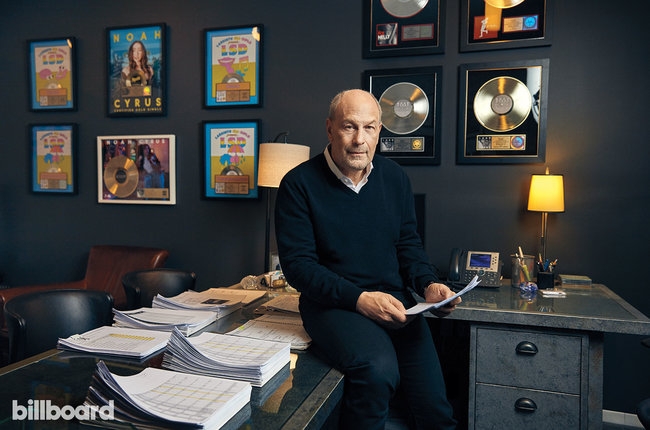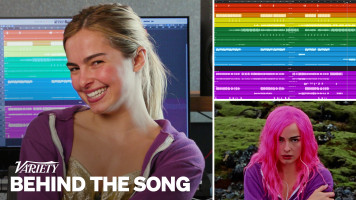How can the little guys compete with the major record companies' flagship labels, which are raking in streaming cash and bidding talent prices into the stratosphere? Barry Weiss, co-founder/CEO of the four-year-old startup RECORDS, now a joint venture with Sony Music, is using his old-school playbook: trusting his ears, betting on acts early and going country in a hip-hop world.
"I'm trying to zig where others zag," Weiss says on a recent afternoon from his office in New York's Soho neighborhood. He's gushing with excitement about how strangely easy it was for him to sign "Prayed for You," a steadily climbing country song by Arkansas singer-songwriter Matt Stell that's now been streamed more than 42.8 million times in the U.S., according to Nielsen Music, and in February reached No. 36 on the Hot Country Songs chart. "I've never done country before, but I know a hit when I hear one," he says. "When it went on [Spotify's playlist] Hot Country, I thought, 'If the record had been on RapCaviar, there would have been 15 labels all over it within an hour.'"
Weiss, who in 1982 joined Jive Records as Zomba Publishing founder Clive Calder's first employee and has developed acts from Britney Spears to Justin Timberlake, is one of a handful of former major-label leaders building new companies from the ground up. Doug Morris, 80, launched 12 Tone Music with support from Apple last year after running all three majors; Antonio "L.A." Reid is growing indie outfit Hitco after leaving Epic Records two years ago; and David Massey is leading the rebirth of Sony's Arista label. All are betting that their experience cultivating superstars in the pre-streaming era gives them an edge in today's data-driven landscape: They can sit out pricey bidding wars over viral artists in hopes of signing bigger acts before they reach the data hounds' radar.
After three years running Universal Music Group's East Coast labels, Weiss launched RECORDS as a joint venture with SONGS Music Publishing in 2015, scoring early wins with artists from Nelly to Noah Cyrus. When Kobalt Capital bought SONGS' catalog in 2017, Sony Music appointed SONGS president Ron Perry chairman/CEO of Columbia and bought SONGS' stake in RECORDS, moving Weiss and his team into the headquarters of Sony's indie distribution arm, RED (which merged into The Orchard later that year). Though Weiss says he's not turning a profit yet, the new partnership gives him a better shot at radio and more capital, covering his overhead and A&R costs. (Songwriter Jenna Andrews, who met Weiss nearly a decade ago as an artist signed to Island Records, is RECORDS' exclusive A&R consultant.)

Weiss also recently co-signed Columbia's Lauren Jauregui, offering the Fifth Harmony alum what he says is "a level of attention, focus and care that's challenging in a corporate environment." RECORDS projects such as LSD (the Labrinth-Sia-Diplo collaboration) run through Columbia as well. Billboard spoke with Weiss about his new country signees (like Dylan Brady), "organic A&R" and R. Kelly.
What led you into country music?
Someone called and told me the writer of a record called "Prayed for You," a guy named Matt Stell, was buzzing in Nashville, and that the record was No. 40 on iTunes. [Reality TV star] Savannah Chrisley's in the video, and that drove a lot of views. So I listened to the record and I said, "This sounds like a fucking hit." It kind of reminded me of a record we had called "Butterfly Kisses" with Bob Carlisle many years ago on Jive that was a ginormous Christian crossover hit. It's just inspirational -- it touches the heartstrings. The record then went up on [Spotify's] Hot Country on a Friday and we cut the deal on a Monday, not knowing what I would do at radio, because I had no country partner. But I said, "I'm not gonna overthink this." I put it through The Orchard, and through the managers' relationships we put together a team of radio promotion people spearheaded by a guy named Keith Gale, who used to run country radio promo at RCA Nashville and now is Jake Owen's manager. He came out of retirement for this record, because he and Jake Owen believe it's such a hit.

Will you continue investing in country?
If I see things we can break. Obviously it's still a competitive market, and I don't want to be stupid, because I'm in New York and I'm not a country guy per se. But it's a great story: a New York exec finding a country record everybody else was sleeping on. Nobody chased the record. I couldn't believe it. I thought, "Either my ears are off or people are just sleeping."
What other tactics are you using?
I'm looking for organic A&R. I don't want to be paying ridiculous prices. I don't mind spending money, but I want to run a business here.
What do you mean by "organic" A&R?
Lennon Stella is an old-fashioned A&R project -- we didn't sign her based on data. She had a bit of a platform because she played Connie Britton's daughter on the show Nashville, as well as the fact that her sister Maisy has a pretty big YouTube presence and they did cover songs as a sister duo. [But the deal] really wasn't competitive; Jenna had been working with her for several years before she brought her in. This is no different than the artist development in my dad's day 50 years ago. I also signed a rapper, 24kGoldn -- he's a freshman at USC, from San Francisco -- he was brought to me by D.A. Doman, a very, very hot rap producer right now.

Was there any data on him?
There was literally no data. This is just a kid that had some great records, and we thought he had an amazing voice. D.A. is executive producing the project for us. I made a healthy, rich deal for a kid who was an unproven talent; that's an example of organic A&R signing. I'd rather get in early if I have the ability to do that.
How did you land Lauren Jauregui?
She'd been straight Columbia, but as a result of Jenna's fervent interest and my great relationship with Larry Rudolph, her manager -- also Britney's manager -- she's now going to be through RECORDS/Columbia. She's got huge global potential. Ron [Perry] has been very intelligent about it -- he thought she'd be well served by the level of attention that we can provide as a very small unit. We're looking for opportunities wherever we can.
You signed R. Kelly to Jive in 1991. What has it been like to watch his saga unfold?
Sad, upsetting, gut-wrenching. I feel terrible about it. To build a global superstar from the ground up is one of the most challenging things -- it's what everybody strives for in this business. And we achieved that, and he was a foundation of Jive Records for many years. He's a uniquely talented guy, and the whole thing is very sad to watch, very disconcerting and challenging emotionally.

This article originally appeared in the April 13 issue of Billboard.





